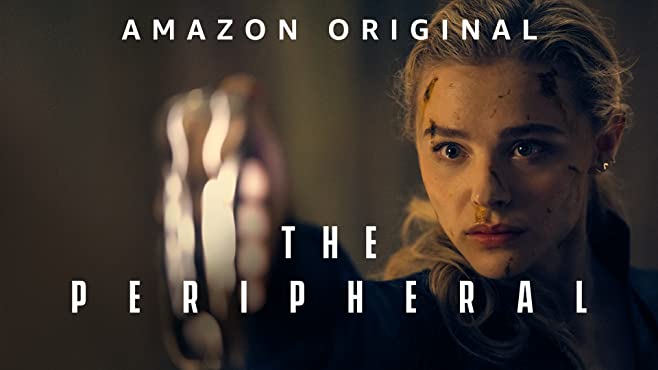I don’t usually review movies and TV shows, or popular culture in general. The exception is posting one-sentence Hot Takes in one of our Discord channels right after I finish watching something: “aside from being a real good acting job from Florence Pugh I think The Wonder might be the most catholic movie I’ve ever seen”, or “Bullet Train: Pretty OK, I guess. I felt bad for the train, having to go through all that”. I’m pointing this out partly as a reminder that if you want access to opinions like “Don’t Worry Darling is an OK movie that wasn’t worth the drama surrounding it’s release, but it is a fun story about the incel matrix”, we have a Patreon, and partly as a means of lowering expectations.
No one told me that Amazon was adapting The Peripheral, a 2014 novel that is definitely a personal favorite and might be a later-career peak for William Gibson, until I saw the trailer drop a few months ago. Most science fiction germinates around one cool idea, and then runs with it. Not always – if you’re Frank Herbert you throw in dozens of them, and if you’re Robert Heinlein you start with a bad idea instead, such as “what if totalitarian fascism rules, actually”. The hook for The Peripheral is, and I promise the execution is much more interesting than this is about to sound: what if you could send emails back in time.

The deal with The Peripheral is that shortly in the future life sucks pretty much the way it does now but a little more: jobs are a little shittier and technology is even more annoyingly ubiquitous. There’s still a Kinkos and it’s the only non-meth job in town, but it prints in 3D now. Later it will take our world to its logical conclusion: the slow-motion apocalypse (economic, ecological, pandemical) that we’ve been living through eventually hits its tipping point, and the apocalypse arrives in force, but in 2032 Appalachia things are still bad but in a recognizable way. Our point of view characters are Flynn Fisher and her brother Burton. Flynn is a Gamer when she isn’t working at the 3D printing store, and Burton is a former army guy who gets paid to Game and is so bored with it that he gets his sister to do it instead.
Then there’s another set of characters on the other side of the end of the world, here called the Jackpot, in 2099 London, where things have been re-built with the help of advanced freakshow technology, but everything still sucks, albeit in novel and inventive ways that nevertheless still feel familiar (kleptocracy, cops, the idle rich). For our purposes, the relevant freak tech is the one that lets them connect to the internet in the past. Concerns about paradoxes get waved away immediately – going back and logging on creates a new continuum, or “stub”, that continues and evolves on its own, so even if you kill your own grandfather (which someone does), it only matters in that particular timeline. There’s no way to send objects back and forth, only data – phone calls, emails, whatever protocol the Peripheral headset uses, etc. Fortunately this is never explained, because any explanation would be corny as hell (the book basically handwaves this as “some weird server we found, no idea how it works”, but the show can’t help but elaborate, though fortunately not overmuch). Stubs are generally created as a sort of laboratory or playground, and a character calling this out as a form of colonization is one of the better moments on offer.
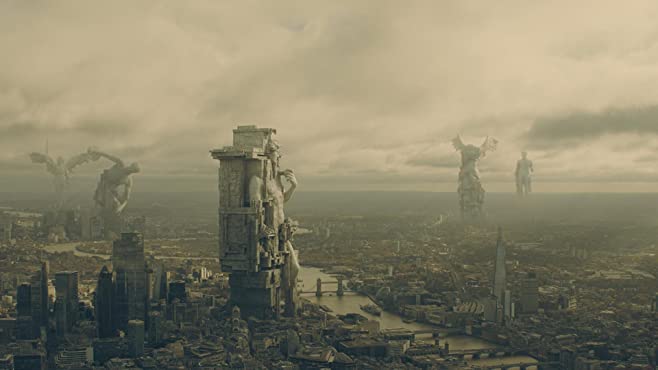
As a Bit, they send some blueprints for a headset back in time, and use it to hook a 2099 robot (the titular Peripheral) up to 2032 Flynn, tell her she’s playing a video game instead of piloting a Terminator in the future, and get her mixed up in a heist that the show doesn’t bother explaining for about six or seven hours while it’s busy spinning wild conspiracies.
So the main appeal is that it combines the two extant types of William Gibson Shit: it’s about both the immediate future being upended by weird technology, and also a book about technically-advanced dirtbags.
Beyond that, and some flashes in the second episode, the show is almost unrecognizable from the source material. Some of this I chalk up to the showrunners – Jonathan Nolan and Lisa Joy, of the dearly departed Westworld, are in charge, and you can see their fingerprints all over. On some level it’s a good fit – The Peripheral was always a murder mystery – but in other ways not so much. The Abramsification of serialized television has led to the replacement of clear coherent narrative with making a show a “puzzle” for the audience to “figure out”, which doesn’t always make for satisfying viewing. Science Fiction has always traded in mystery, but this isn’t that. What it is, is the other kind of mystery, the Lost kind, where the author simply doesn’t give the audience the information they need to understand what’s going on (to be fair, it does reward close viewing, and I appreciate the lack of spoon-feeding, but even paying attention and having read the book I was in the dark for large portions of it). It requires a degree of faith in the writers to stick the landing, and not spin wild threads that never resolve, but at least this way the audience has something to speculate about around the water cooler at the office. I hate this trend, generally speaking.
Considering the history of adapting Gibson’s work I should be happy to have anything. Projects seem to languish in development hell at a higher rate for him than anyone else. The only two previous to this that actually made it to the screen are based on his early short stories: the execrable Keanu Reeves vehicle Johnny Mnemonic, and what sounds like a truly insane project that I am dying to see, a take on New Rose Hotel directed by, of all people, Abel Ferrara.
The show spends far more time in the 2032 timeline than it does in 2099, which can leave it feeling like an episode of Justified at times. Corbell Pickett, the local Boss Hogg equivalent, being elevated to the Shogun of goddamned crime certainly doesn’t help. The upside here is that Burton’s crew of technologically-enhanced ex-army guys get fleshed out more, which I enjoyed at first but eventually starts to feel more like a budgetary decision than a storytelling one. Here again the writers can’t resist being clever, and tie Burton’s haptic implants into the main story: they’re technology sent back from the future as part of a wider insidious scheme, instead of being allowed to be their own thing that developed independently. Maybe not every loose end needs to be tied up.
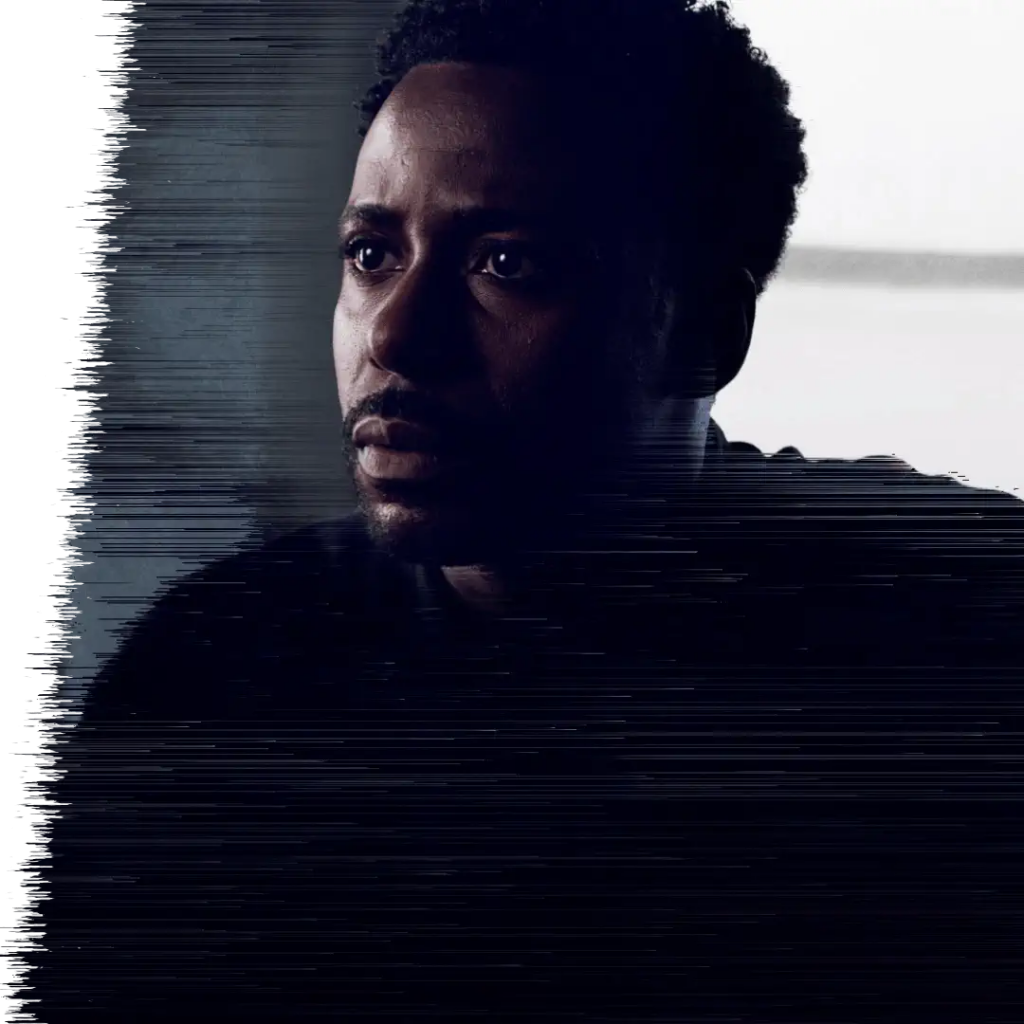
But the biggest downside is that we get less time in 2099, and thus less of Gary Carr’s ambiguous “fixer” Wilf Netherton and his various mob-adjacent associates, who are uniformly excellent despite being somewhat marginalized. To be honest, I liked Wilf better as a hungover slacker PR flack in the book, but Carr does a good enough job that his interpretation is growing on me. And I loved the throughline that American rednecks are so buck wild that people from the future keep getting owned by them.
On the whole this is a more action-packed version of the story and while I’m not saying I’m against invisible cars or Chloë Grace Moretz (as Flynn) doing vicious karate kicks on dudes, I do genuinely start to worry that the naysayers were right and that Gibson is unadaptable. Not because of anything particular to his writing, in this case: there’s no complex interwoven A and B plots that only come together at the end, and it’s not taking place in a cyberzone that costs a million dollars a minute to film. I think he’s unadaptable because TV executives keep fucking it up, and will always fuck it up, because they can’t shoehorn his stories into their fixed idea of what a show ought to look like.
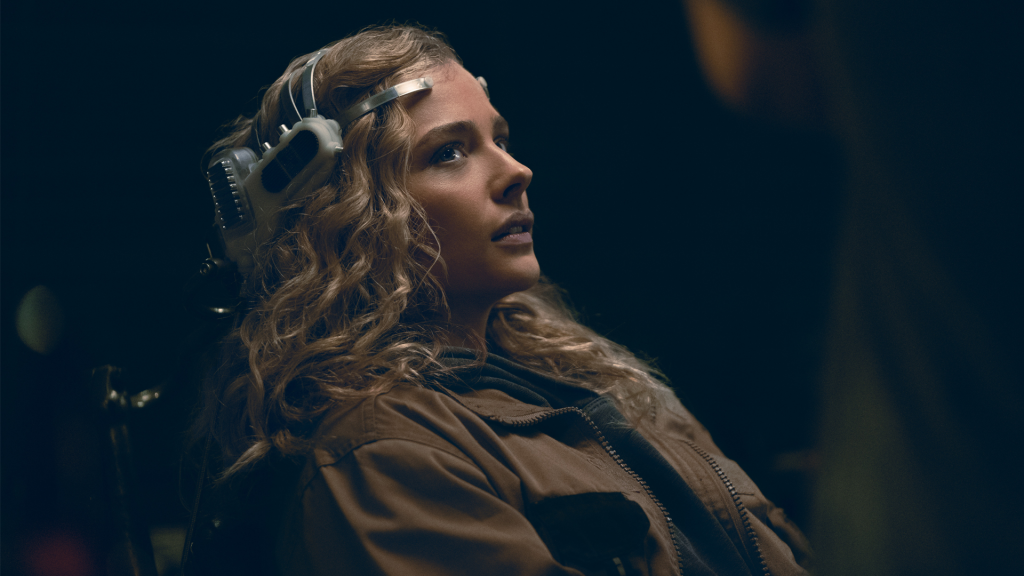
For all of that, turning a fairly taut book into four movies’ worth of TV, it doesn’t feel like as much happens. There’s a lot of padding in the form of unwelcome side-plots and welcome character development, but it feels like half the cool stuff from the book never shows up. I assume this is the showrunners keeping their powder dry for a second season’s worth of Content, but it left me waiting with baited breath for cool stuff to happen, and often didn’t pay off. After 8 episodes, the first season ends with at least four simultaneous rotating cliffhangers, clearly planning for a second season and ensuring that this one doesn’t function as its own story. On the one hand, this means we could get even more Peripheral than what was in the book. On the other, if this gets canceled after one season, it’s totally fucked, and is a story with no ending at all.
On the positive side, there’s a clever Quantum Suicide element that wasn’t in the book, but it’s introduced and resolved so quickly that it almost doesn’t register, and I liked the actors for the most part – it’s more diverse that I’d been expecting from a genre show, which is one of the few unalloyed good things I can say. The lone exception to the great casting is Jack Reynor, who plays Burton Fisher. It’s not his fault, and he does good work, but unfortunately for me (and, I guess, fortunately for him) he resembles a de-aged Buff Chris Pratt, and I was never able to disengage the part of my brain that thinks Chris Pratt sucks. Alexandra Billings as Ainsley Lowbeer is perfectly cast, and maintains the character’s calmly terrifying blend of Sherlock Holmes and Judge Dredd, but shows up too late to carry the show the way she carries the book. One of the characters created from whole cloth here, a hang-dog Irish hitman who seems ready to declare that he’s too old for this shit, gives a cool monologue about knives.
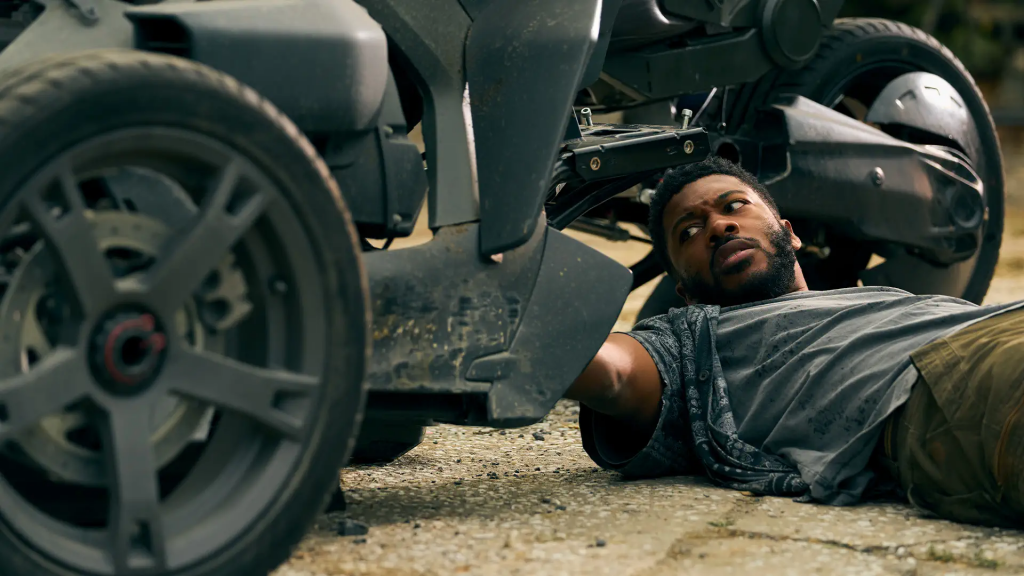
The closest thing I can compare this to – other than the late addition of a plot hook to do with free will and memory control that essentially turns it into a cut-rate version of the last two seasons of Westworld – is Amazon’s The Man In The High Castle. In both cases, the adaptation takes the basic premise, veers away from the plot almost immediately, and instead sets up a longer-running open-ended story more suitable for big series orders.
My biggest issue is more personal: the book is one of my genre favorites, and I carried that baggage into the show. It was always impossible for it to live up. The book succeeded on two merits: Gibson’s writing there is some of his best since Neuromancer, and the Jackpot, the confluence of catastrophes that combine to destroy the world, was frighteningly plausible. Some version of it is probably going to actually happen in real life. The show lacks the former and shows flashes of the latter, but belabors the wrong points. It has more in common with the two highly questionable X-Files episodes Gibson wrote than it does with its own source material. I’d rather it have been allowed to be weird, instead of attenuating it though a layer of network interference.
This is fine 6/10 television. Not insulting to the audience or a waste of time, but I’m not cyberbullying people into watching either. In the show’s defense, I checked the first page of Amazon reviews, and everyone either gave it 4-5 stars for being a good adaptation, or 0-1 stars and cried about how it was “woke” or “PC” because there are women and people of color on screen, so at least it had the output of making some of the worst people online angry, which: good. Fuck ’em.
Fortunately, The Peripheral is a book about different timelines screwing with each other, so maybe think about the show as a different stub, and the one from the book – the one with Daedra, and the Pacific Garbage Patch getting bombarded by hypersonics, but without the Research Institute, or the high body count – is still out there.
All eight episodes of The Peripheral are now streaming on Amazon Prime, with the finale airing last week. Or just buy the book instead. Have any questions or feedback? Drop us a note in the comments below or email us at contact@goonhammer.com.
